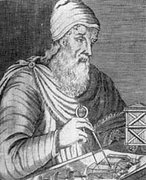Archimedes
Archimedes (c.287 BC – c.212 BC), born in Syracuse, Sicily, is regarded not only as one of the greatest mathematicians and scientists of antiquity but also as one of the three greatest mathematicians of all time, along with Isaac Newton and Johann Carl Friedrich Gauss. He made founding contributions to the fields of hydrostatics, static mechanics, and pycnometry (the measurement of the volume or density of an object). He determined hydrostatic principles governing floating bodies, which are still applied to swimming today. He is also known as the "father of integral calculus." Archimedes was an outstanding engineer; he formulated the Archimedes' principle of buoyancy and the law of the lever. It is supposed that Archimedes was the inventor of the screw, a device that can be used to raise water from a lower level to a higher level by turning a handle. Moreover, he is accredited with designing many war machines used in the defense of his hometown of Syracuse, Sicily, including the construction of lenses to focus the sun's light on Roman ships and huge cranes that were used to rotate the lenses.
Further Reading
- Drexel University. A collection of Archimedean miscellanea.
- University of Utah. Archimedes and the Computation of Pi.
